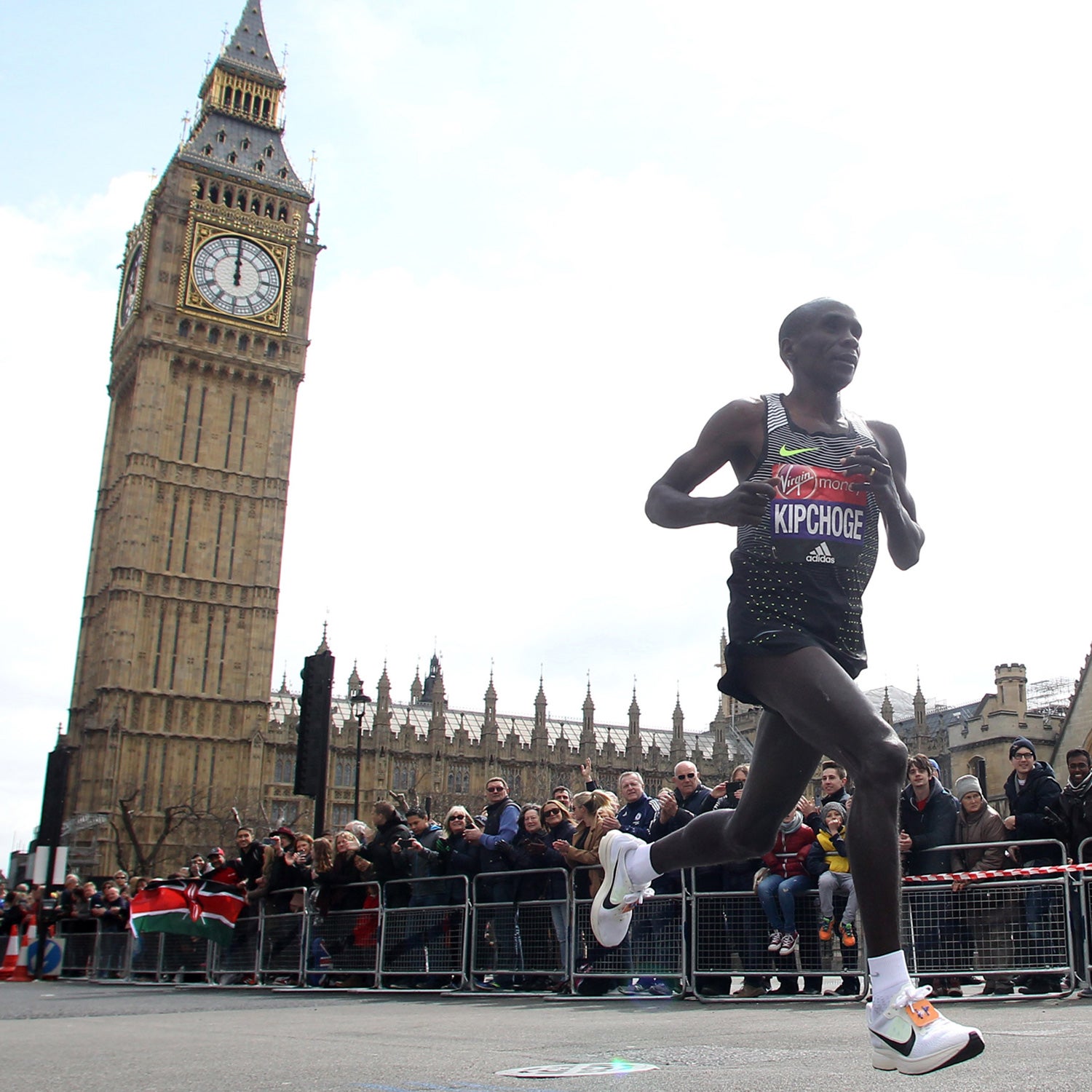On Sunday, April 24, I woke up at 4:45 a.m. to watch a live stream of the London Marathon on my laptop. Most people I know would regard this as a sign of burgeoning insanity, but I had good reason. The London Marathon field was once again stacked with stars of the sport, including current and former world holders Dennis Kimetto and Wilson Kipsang, as well as reigning NYC Marathon champion Stanley Biwott. Ethiopian Kenenisa Bekele, world record holder in the 10,000 and 5,000 meters and arguably the best track runner in history, was also in the mix.
And then there was the maestro, Eliud Kipchoge. The 31-year old Kenyan deserves separate mention because he is, at present, very much in a league of his own. He proved it again that Sunday, winning in 2:03:05 (a mere eight seconds off Kimetto’s world record) and easily vindicating my decision to get up before dawn to sit in the dark and watch two hours of running on a 13-inch screen.
The defining moment came late in the race. With less than two miles to go, Biwott and Kipchoge were still running side by side, seemingly bracing themselves for a showdown sprint on the Buckingham Palace Mall. Both men still looked comfortable but suddenly, and without any discernable increase in effort, Kipchoge began to open up a gap, as though he’d found an invisible moving walkway on the banks of the Thames. Within one minute, the race had been decided. Check it out.
Since Kipchoge’s time was the third fastest marathon in history, and second fastest on a record-eligible course, it prompted some post-race discussion of where this performance ranked on the all-time greatest marathons list. The editors of the fan-site LetsRun.com argued that Kipchoge’s race was “probably #1,” largely because of the quality of the competition and the generally accepted fact that London is a slower course than Berlin, where the last six official men’s world records have been set.
But assessing great marathon performances is a tricky business.
On the one hand, achievement in distance running is refreshingly quantifiable. Anyone who wants to play it straight can assert that whoever holds the official world record (and wasn’t on mega drugs) also holds the claim to greatest marathon performance. That would be Dennis Kimetto (2:02:57*, Berlin ’14) for the men and Paula Radcliffe (2:15:25, London ’03) for the women.
While a hierarchy of marathon performance based solely on finishing times avoids the subjectivity that can make other “greatest ever” sports arguments rather tiresome, it will always favor a certain kind of race and runner. The fastest times are achieved on flat courses in ideal conditions, so whoever holds the world record will not have been tested by precisely those factors by which some marathoners might prove their worth.
As our friends at LetsRun suggest, the late Sammy Wanjiru’s Olympic victory in 2008 deserves consideration for greatest marathon ever, even though he only ran 2:06:32, a time which these days doesn’t even crack the top 200. Despite temperatures being well into the 80s that day in Beijing, Wanjiru pushed the pace hard from the start in a bold display of weather-be-damned front running that resulted in an Olympic record. Though it’s of course impossible to say, it doesn’t seem too far-fetched to posit that this victory in a major race required more physical and mental toughness (and courage) than Kipchoge’s effort on a cool day in the English capital.
Also, Kipchoge had pacesetters. The “pacers ruin races” argument, which I’ve addressed before, provides a significant caveat to the idea that, in the world of marathoning, “fastest” automatically means “best.” These fastest times are run when “rabbits” inject an aggressive pace from the start, essentially pulling elite runners along in the early stages of the race. (The first mile of the 2016 London Marathon, which uses pacesetters, was covered in an obscene 4:30.) There’s a sense in which rabbited marathons are hence more like time trials than races, and offer an unfair advantage to those whose strength is speed, rather than tactical savviness. With a lifetime PR of 2:08:37, American Meb Keflezighi was never a fast marathoner by the standards of world elites, but shrewd racing has earned him victories in major (unrabbited) marathons over the years, like the New York and Boston. Discussions about great running, and, specifically, great racing, need to take more notice of runners like Meb.
Keflezighi has also won a silver medal in the Olympic Marathon, the most prestigious of all unrabbited races. Eliud Kipchoge wants to do him one better by taking gold at this summer’s Olympics in Brazil. To do so, the number one-ranked marathoner in the world will have to prove that he can be just as dominant in a tactical, championship-style race, as he has been in paced affairs like Berlin and London.
I can’t wait. Good thing Rio is (almost) in my time zone.
*An earlier version of this article listed Dennis Kimetto's Berlin 2014 marathon time as 2:59:57. It was actually 2:02:57.


